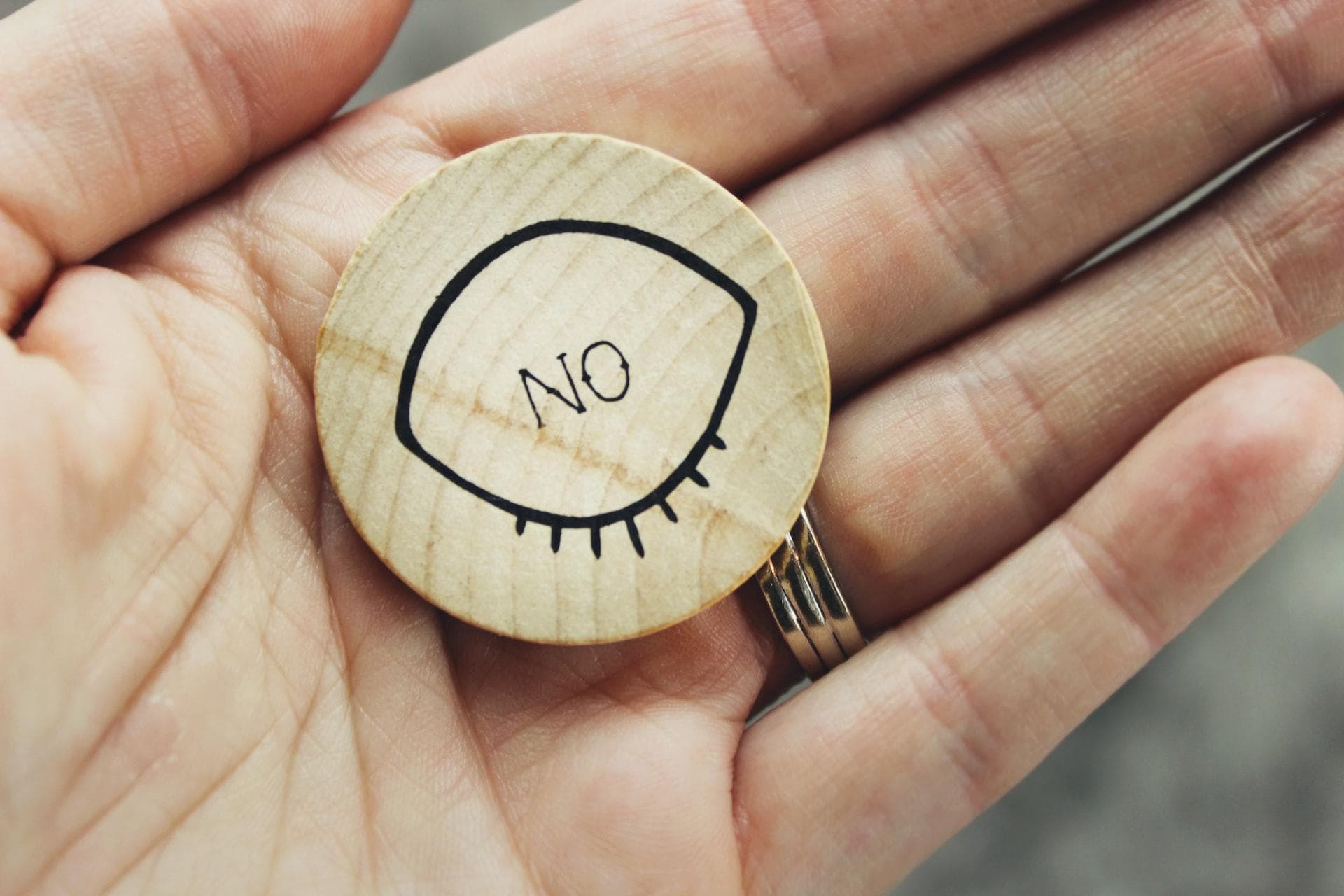To learn Chinese, one of the most important skills is communication. To make conversations in Chinese, we often come across yes and no questions. So how should we respond properly?
In a previous article, we talked about how to say "yes" in Chinese. And there is also another article that discusses how to say "ok" in Chinese.
But what about "no"?
There are plenty of situations where we want to respond with negative expressions.
The most direct and also the easiest way to say "no" in Mandarin Chinese is 不 (bù), but it's not always as simple as just saying this one word.
Below, let's look at a few different ways and words for negative responses.
不 (bù)

不 by Itself
不 means "no", and as we mentioned above, it's the most direct way to say "no".
You can say 不 similar to "no" in English, but it often comes off rude if only respond with this one-character word.
See examples:
A: 吃完晚饭就去学习吧! - Go study after dinner!
B: 不! - No!
A: 我觉得这篇论文的观点很正确。 - I think the point of this paper is quite correct.
B: 不,我不这么认为。 - No, I don't think so.
For the first example, the answer with solely "不" sounds aggressive and rude. For the second example, there is a whole sentence stating the person's opinion following "不", making it a less aggressive and clearer response.
Adding 不 to "Yes" Words
While we can use "不" by itself as in the examples above, the more common usage is to combine 不 with a "yes" word - and we've discussed how to say "yes" thoroughly.
In such cases, 不 is better translated as "not" rather than "no".
Some commonly used words are introduced below.
不是 (bù shì, often pronounced "bú shì" in oral Chinese)

是 means "is", and is a common way to express "yes" in Chinese. And adding "不" in the front,不是, means no, more specifically, "is not".
It is used commonly for negative responses, especially for yes or no questions containing the word "是".
A: 这是你的书吗? - Is this your book?
B: 不是。 - No.
A: 这是你拍的照片吗? - Did you take this photo?
B: 不是,是小明拍的。 - No, it's Xiaoming who took it.
不对 (bù duì, often pronounced "bú duì" in oral Chinese)

对 means "right/correct", and 不对 means "wrong". This is often used to refute one's point of view, and/or to make corrections.
A: 一加一等于十一。 - One plus one equals eleven.
B: 不对,一加一等于二。 - No, one plus one equals two.
A: 作业周三交是吧? - The homework is due Wednesday, right?
B: 不对,是周二交。 - No, it's due Tuesday.
不行 (bù xíng)

行 is commonly used for agreement or acceptance, and 不行 is used for disagreement or rejection in general. The translation for 不行 in English is "no" or "can't".
A: 我们今天去逛街吧! - Let's go shopping today!
B: 不行,我今天需要写作业。 - No (I can't), I need to do homework today.
不可以 (bù kě yǐ)

Similar to 不行 above, 不可以 also means "can't", and is commonly used for disagreement or rejection. But the difference is that 不可以 often means permission is denied, or unable to do something, while 不行 can be used more generally.
A: 妈妈,让我再看会儿电视吧! - Mom, let me watch TV for a little longer (please)!
B: 不可以。你应该去写作业了! - No (you can't). You should go do your homework!
A: 你可以帮我个忙吗? - Can you do me a favor?
B: 不可以。 - No (I can't).
Note that here for both cases, 不行 also works. But for the example above (given in the section for 不行), 不可以 doesn't work very well.
不能 (bù néng)

While both 可以 and 能 mean "can", they have different usages. 可以 means granting permission and/or having the ability to do something. And 能 means having the ability or the possibility to do something.
Correspondingly, 不能 means impossible or unable to do something.
A: 你现在能帮我买点东西吗? - Can you help me buy something right now?
B: 不能 (or 不可以),我现在没时间。 - No (I can't), I don't have time right now.
A: 我能明天去找你吗? - Can I find (hang out with) you tomorrow?
B: 不能,明天我就回家了! - No, I'll go home tomorrow!
Again, 不行 can also be used here for both examples.
不会 (bù huì, often pronounced "bú huì" in oral Chinese)

One of the translations for 不会 is also "can't", but it has a very different meaning compared to 不行, 不可以, and 不能 above.
会 means having the skill of doing something, or someone will/is going to do something. And therefore, 不会 means don't have the skill to or won't do something.
Let's see some examples below.
A: 你会做饭吗? - Can you cook?
B: 不会。 - No (I can't).
A: 你明天会去逛街吗? - Will you go shopping tomorrow?
B: 不会。 - No (I won't).
Note that here, 不会 cannot be replaced with 不行 (or any other words mentioned above).
But for the second example, you could also say "不去", meaning "I'm not going". We will dive into this type of format (不 + verb) below.
不要 (bù yào, often pronounced "bú yào" in oral Chinese)

要 can mean "is going to" or "wanting to" do something. And when used in responses, 不要 typically means "don't want to" do something, expressing rejection and/or a lack of interest.
A: 下课后要一起去图书馆自习吗? - Shall we go to the library to study together after class?
B: 不要,今晚我想放松一下。 - No (I don't want to), I want to relax tonight.
Please pay attention that 不要 is an informal way of saying "no", typically used towards friends.
Alternatively, you could replace 不要 with 不了 (bù le), which is a more polite way for rejection, but also less emotional than 不要.
Another thing worth mentioning is that when people use 不要 in an imperative sentence, it means "don't".
Example:
你生病了,今天不要去学校了。 - You are sick, don't go to school today.
不好 (bù hǎo)

好 means "good/great", generally used to express agreement or acceptance. Correspondingly, 不好 can be used for disagreement or rejection - this is similar to 不要 above.
(Note that 不好 also means "not good" or saying something is wrong.)
A: 和我去看电影吧,好不好? - Go to the movie with me, okay/please?
B: 不好,我很忙。 - No, I'm busy.
However, this usage of 不好 is not very common. It's also informal, typically used towards people you're close to.
More commonly, people would directly respond as 不 + the verb/adj used in the question for rejection or disagreement, see below.
不 + verb/adj.

We have mentioned many different responses we can use to say "no" above, which are used in different contexts respectively.
However, in real life, there are unlimited ways to express "no" for more specific situations.
As we've discussed in how to say "yes" in Chinese, we can directly repeat the verb (sometimes the adjective) part of the question to express affirmation. Similarly, we can do this for negative responses by adding 不 to the verb or adjective - 不 + verb/adj.
Let's look at some examples.
A: 你吃辣吗? - Do you eat spicy food?
B: 不吃。 - No, I don't.
A: 你喜欢游泳吗? - Do you like swimming?
B: 不喜欢。 - No, I don't (like it).
A: 你需要帮忙吗? - Do you need help?
B: 不需要/不用了。 - No (no need).
A: 这件衣服你觉得好看吗? - Do you think this dress looks good?
B: 不好看。 - No (it's not pretty).
A: 你很讨厌我吗? - Do you hate me?
B: 不讨厌。 - No, I don't.
In fact, if we look at the words we've mentioned in the above sections again, they generally follow the same rule here as well - 不 + the verb (or adj.) part of the question sentence.
But pay attention, for past/perfect tense and "is/are there…" questions, we need to use 没 instead of 不. And that's what we're going to dive into next!
没 (méi)
没 means "not". Like 不, it's very commonly used for negative expressions. However, it's rarely used by itself. Instead, people typically use it as 没有 or 没 + verb for past/perfect tense.
Let's take a closer look at its usage.
没有 (méi yǒu)

没有 directly translates to "don't have", but a better translation is "there isn't" or "haven't".
A: 你有铅笔吗? - Do you have a pencil?
B: 我没有。 - No, I don't.
A: 这里有洗手间吗? - Is there a bathroom?
B: 没有。 - No.
The two examples above are asking if someone has something and if there is something at some location. Here 没有 indicates lack of possession/existence.
Note that here 没有 is generally present tense, not past or perfect tense.
But more often, 没 and 没有 are used for past/perfect tenses. See below.
A: 你作业写完了吗? - Have you finished your homework?
B: (还)没有。 - No (not yet).
A: 你吃饭了吗? - Did you eat?
B: 没有。 - No.
Past/Perfect Tense - 没 + verb

While 没有 is a general word used for denying someone did/has done something, people would also use the format of 没 + verb to express didn't or haven't done something, which is more specific than 没有.
A: 你去图书馆了吗? - Did you go to the library?
B: 没去。 - No, I didn't go.
A: 你看这部新电影了吗? - Did you see the new movie?
B: 没看。 - No, I didn't.
Pay attention that, 没有 works here too since it's the general term people use.
Additionally, you can also say 没有 + verb-过 to express haven't done something.
So, let's take the examples above:
没去 - didn't go; 没有去过 - haven't gone/been
没看 - didn't see; 没有看过 - haven't seen
Characters of "No"

Other than 不 and 没, there are in fact many more characters people use for negative expressions in Chinese. But none of them is as commonly used as 不 and 没.
Nevertheless, it's useful to be aware of these characters.
Below is a list of characters for saying "no".
| Character | Pinyin | Translation | Notes |
| 不 | bù | No/not | Details are given above |
| 没 | méi | No/not | Details are given above |
| 否 | fǒu | No/not | Typically used for negation, opposite of "是" (yes/is) |
| 非 | fēi | No/not | Similar to the prefix non-/un- |
| 无 | wú | None/null | Similar meaning to "没有" for lack of possession/existence, but it's more formal and less used |
| 别 | bié | Don't | Similar to "不要" when used as "don't"(Also has other meanings, but omitted here) |
| 勿 | wù | Don't | Similar to 别, but more formal, typically used with 请 (qǐng) - 请勿 (please don't…) |
| 莫 | mò | Don't | An older and more formal form of 别/不要 |
| 未 | wèi | Not yet | This indicates something is not yet done or hasn't happened |
| 错 | cuò | Wrong | The opposite of "对" (correct/right) |
| 差 | chā | Difference, not quite, errors | Express something is not quite there or not quite the same, or something is not very good or not right |
Final Thoughts
We introduced two general ways how to say "no" in Chinese above - negating words/phrases with 不 and with 没.
But even with only these two characters, there are countless words we could use to express negation, rejection, and refusal.
It's important to know what the proper word is to use that would convey the meaning you want to express. Nevertheless, even if you don't know all the words, you can also make use of body language and the tone of your voice to help express what you want to say.
Remember that just like saying "yes", being able to say "no" is also an essential part of communication in any language, and don't be afraid to use it when necessary!